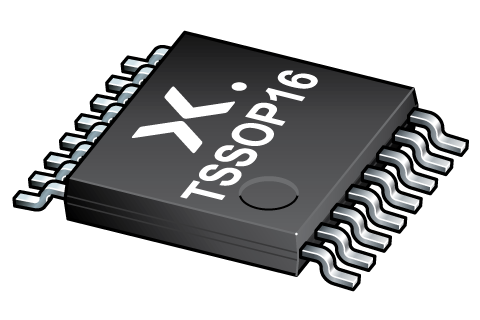Orderable parts
| Type number | Orderable part number | Ordering code (12NC) | Package | Buy from distributors |
|---|---|---|---|---|
| 74HC173PW | 74HC173PW,118 | 935189550118 | SOT403-1 | Order product |
Discover Nexperia’s extensive portfolio of diodes, bipolar transistors, ESD protection devices, MOSFETs, GaN FETs, IGBTs, and analog & logic ICs. Our components power virtually every electronic design worldwide - from automotive and industrial to mobile and consumer applications.
Our products find applications across various industries, from automotive and industrial to power, computing, consumer, mobile, and wearables. With a commitment to innovation and sustainability, our components set benchmarks in efficiency, empowering our global customer base to develop energy-efficient and cutting-edge solutions.
Try out our devices and their performance with our comprehensive range of evaluation boards. Gain a deeper understanding of how our products can benefit your application, whether it's optimizing for efficiency, robustness, or reliability. You can find Application focus, Package focus, and different Nexperia Product focus boards here.

Register once, drag and drop ECAD models into your CAD tool and speed up your design.
Click here for more informationQuad D-type flip-flop; positive-edge trigger; 3-state
The 74HC173; 74HCT173 is a quad positive-edge triggered D-type flip-flop. The device features clock (CP), master reset (MR), two input enable (E1, E2) and two output enable (OE1, OE2) inputs. When the input enables are LOW, the outputs Qn will assume the state of their corresponding Dn inputs that meet the set-up and hold time requirements on the LOW-to-HIGH clock (CP) transition. A HIGH on either input enable will cause the device to go into a hold mode, outputs hold their previous state independently of clock and data inputs. A HIGH on MR forces the outputs LOW independently of clock and data inputs. A HIGH on either output enable pin causes the outputs to assume a high-impedance OFF-state. Operation of the output enable inputs does not affect the state of the flip-flops. Inputs include clamp diodes. This enables the use of current limiting resistors to interface inputs to voltages in excess of VCC.
Complies with JEDEC standard no. 7A
Input levels:
For 74HC173: CMOS level
For 74HCT173: TTL level
Gated input enable for hold (do nothing) mode
Gated output enable control mode
Edge-triggered D-type register
Asynchronous master reset
ESD protection:
HBM: ANSI/ESDA/JEDEC JS-001 class 2 exceeds 2000 V
CDM: ANSI/ESDA/JEDEC JS-002 class C3 exceeds 1000 V
Specified from -40 °C to +85 °C and -40 °C to +125 °C
| Type number | VCC (V) | Logic switching levels | Output drive capability (mA) | tpd (ns) | fmax (MHz) | Power dissipation considerations | Tamb (°C) | Rth(j-a) (K/W) | Ψth(j-top) (K/W) | Rth(j-c) (K/W) | Package name |
|---|---|---|---|---|---|---|---|---|---|---|---|
| 74HC173PW | 2.0 - 6.0 | CMOS | ± 7.8 | 17 | 88 | low | -40~125 | 107 | 1 | 33.8 | TSSOP16 |
| Model Name | Description |
|---|---|
|
|
| Type number | Orderable part number, (Ordering code (12NC)) | Status | Marking | Package | Package information | Reflow-/Wave soldering | Packing |
|---|---|---|---|---|---|---|---|
| 74HC173PW | 74HC173PW,118 (935189550118) |
Active | HC173 |

TSSOP16 (SOT403-1) |
SOT403-1 |
SSOP-TSSOP-VSO-WAVE
|
SOT403-1_118 |
| Type number | Orderable part number | Chemical content | RoHS | RHF-indicator |
|---|---|---|---|---|
| 74HC173PW | 74HC173PW,118 | 74HC173PW |
|
|
| File name | Title | Type | Date |
|---|---|---|---|
| 74HC_HCT173 | Quad D-type flip-flop; positive-edge trigger; 3-state | Data sheet | 2024-01-15 |
| AN11044 | Pin FMEA 74HC/74HCT family | Application note | 2019-01-09 |
| SOT403-1 | 3D model for products with SOT403-1 package | Design support | 2020-01-22 |
| Nexperia_package_poster | Nexperia package poster | Leaflet | 2020-05-15 |
| TSSOP16_SOT403-1_mk | plastic, thin shrink small outline package; 16 leads; 0.65 mm pitch; 5 mm x 4.4 mm x 1.1 mm body | Marcom graphics | 2017-01-28 |
| SOT403-1 | plastic, thin shrink small outline package; 16 leads; 5 mm x 4.4 mm x 1.2 mm body | Package information | 2023-11-08 |
| SOT403-1_118 | TSSOP16; Reel pack for SMD, 13"; Q1/T1 product orientation | Packing information | 2020-04-21 |
| 74HC173PW_Nexperia_Product_Reliability | 74HC173PW Nexperia Product Reliability | Quality document | 2025-03-20 |
| HCT_USER_GUIDE | HC/T User Guide | User manual | 1997-10-31 |
| SSOP-TSSOP-VSO-WAVE | Footprint for wave soldering | Wave soldering | 2009-10-08 |
If you are in need of design/technical support, let us know and fill in the answer form we'll get back to you shortly.
The Nexperia Longevity Program is aimed to provide our customers information from time to time about the expected time that our products can be ordered. The NLP is reviewed and updated regularly by our Executive Management Team. View our longevity program here.
| File name | Title | Type | Date |
|---|---|---|---|
| SOT403-1 | 3D model for products with SOT403-1 package | Design support | 2020-01-22 |
| Model Name | Description |
|---|---|
|
|
| Type number | Orderable part number | Ordering code (12NC) | Status | Packing | Packing Quantity | Buy online |
|---|---|---|---|---|---|---|
| 74HC173PW | 74HC173PW,118 | 935189550118 | Active | SOT403-1_118 | 2,500 |
|
As a Nexperia customer you can order samples via our sales organization.
If you do not have a direct account with Nexperia our network of global and regional distributors is available and equipped to support you with Nexperia samples. Check out the list of official distributors.
The interactive datasheets are based on the Nexperia MOSFET precision electrothermal models. With our interactive datasheets you can simply specify your own conditions interactively. Start by changing the values of the conditions. You can do this by using the sliders in the condition fields. By dragging the sliders you will see how the MOSFET will perform at the new conditions set.